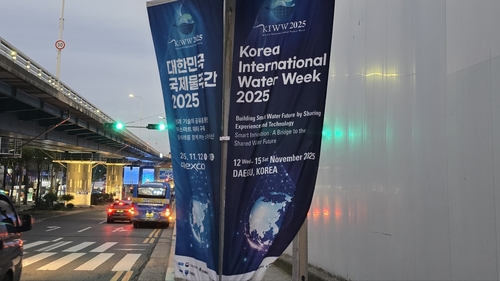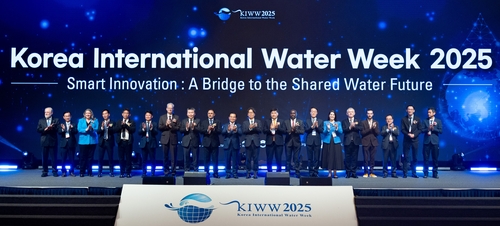(Daegu=Yonhap Infomax) ○…The 'Korea International Water Week (KIWW) 2025', which opened at EXCO in Daegu on the 12th, marks its 10th anniversary as South Korea's leading international event in the water sector.
Senior officials from environment ministries and water management experts from 60 to 70 countries worldwide are gathering to share knowledge and experiences in addressing water-related challenges. The event serves as a global platform for collective action to tackle climate crises such as droughts and floods.
This significant event has been held annually in Daegu for the past decade without interruption—a fact rooted in the city’s unique history.

Daegu was one of the cities most severely affected by the 1991 phenol spill incident. A large quantity of phenol leaked from the Doosan Electronics plant in Gumi, North Gyeongsang Province, contaminating the Nakdong River and severely polluting tap water in Daegu, Busan, and Masan, among other regions in Yeongnam. At the time, Daegu’s Waterworks Headquarters was inundated with complaints from citizens about foul odors in the tap water.
This incident prompted Daegu to focus all its resources and attention on water management, prioritizing policies to ensure safe and clean water for its citizens. As the phrase 'source of life' suggests, water plays a critical role in the birth and sustenance of all living things.
Relevant ministries, including the Ministry of Climate, Energy and Environment, and the central government also lent their support.
In 2015, Daegu successfully hosted the 7th World Water Forum, the world’s largest water-related event, raising South Korea’s profile and competitiveness in the global water industry. Hosting the forum was a catalyst for Daegu’s transformation into a 'city of water.'
The following year, in 2016, the government established the National Water Industry Cluster, a strategic industrial complex in Daegu, signaling a commitment to fostering water-related companies at the national level. The cluster supports the entire lifecycle of water companies, from technology development to overseas expansion.
The Korea International Water Week was also launched at this time.
The Ministry of Climate, Energy and Environment, Daegu Metropolitan Government, Korea Water Resources Corporation (K-water), Korea Environment Corporation, and Korea Water Forum collaborate annually to organize diverse programs centered on water. The event features high-level meetings, special sessions, forums, competitions, and exhibitions, providing a venue to discuss solutions to water issues in the era of climate crisis.
At the opening ceremony on the 12th, Hong Seong-ju, Deputy Mayor for Economic Affairs of Daegu, stated, "Daegu has experienced both major and minor water issues since the Nakdong River phenol incident. Over the past decade, we have nurtured water companies through the water cluster and hosted the International Water Week, continuously seeking systematic approaches to water management."

While the event is held annually, its content evolves each year. Organizers rigorously consider how to provide practical solutions to global water challenges, focusing on delivering 'tailored' solutions for each country through various cooperation initiatives.
This year’s Water Week is themed 'Smart Innovation for the Future of Water.' In line with current trends, the event introduced the 'AI Transformation in Water Management' initiative, leveraging artificial intelligence (AI) across the entire water management process—from prediction and production to supply—to enhance safety and efficiency.
Case studies were presented on using AI and digital twins to improve flood forecasting and dam and river management, along with the resulting benefits. During Water Week, K-water operated a purification process using AI and big data, earning the OECD’s international quality certification (BDN) for its 'AI Water Treatment Plant,' further underscoring the significance of these advancements.
In this way, Daegu has transformed from a city scarred by the phenol spill into a leader in global water cooperation, extending its efforts beyond South Korea. The notion that Daegu will shape the 'future of water' is far from an exaggeration, fueling expectations for the next 10 or 20 years of Water Week.
Tao Chetha, Minister of Water Resources and Meteorology of Cambodia, commented, "Korea’s Water Week is a crucial platform where government and private sectors come together to discuss water issues and find solutions."
(Industry Department, Su Jin Yoo reporter)
sjyoo@yna.co.kr
(End)
Copyright © Yonhap Infomax Unauthorized reproduction and redistribution prohibited.

